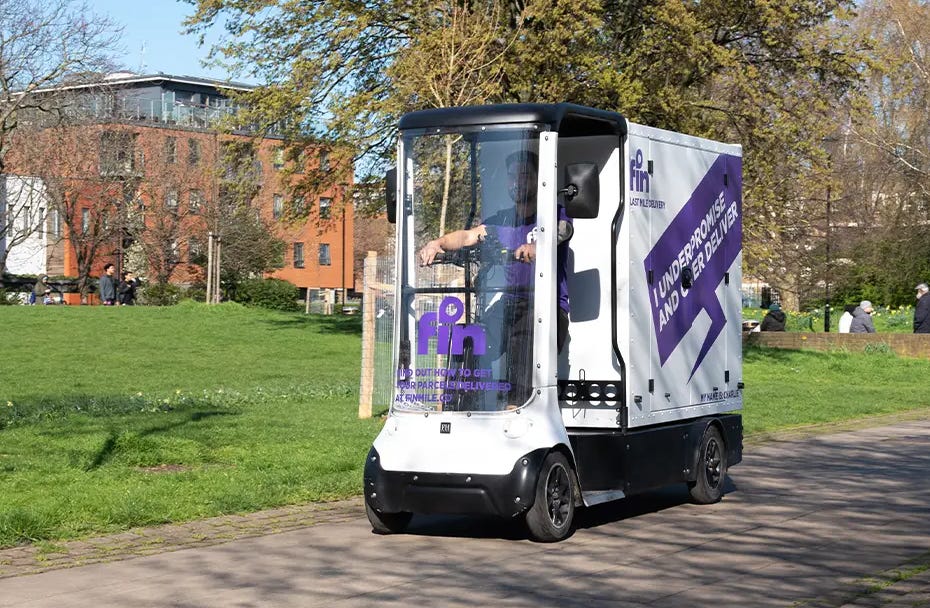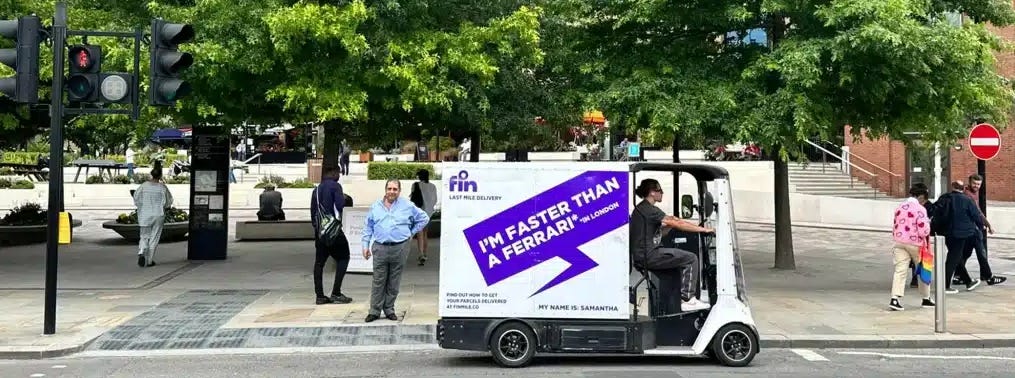Fin Puts Sustainability Front and Center in London's Delivery Scene
CEO Rich Pleeth shares growth & operation strategies
While this publication often explores the automation of delivery, it’s just as important to understand all the transformative changes happening on the human-powered side of the equation. Towards that end, OttOmate sat down with Rich Pleeth, Co-Founder and CEO of Fin. His London-based company puts sustainability front and center, with a delivery fleet composed of pedal-powered quadbikes for city routes, and electric vans for the suburbs. This has won the company some marquee customers, including not only those that like the green aspect, but those drawn simply to the speed advantage of a fleet that can cut through traffic.
OttOmate: Let’s start with the basics, what’s Fin?
Rich Pleeth: Fin is on a mission to make cities more livable by getting rid of the van in urban centers. Whether you order a new gadget or coffee pods, it's likely to show up at your doorstep via a delivery truck or van with a big powerful engine. They get the job done, but they emit lots of carbon, take up lots of room and kill and injure lots of people.
Commercial vehicles account for 19% of the overall miles driven in London. But they emit 30% of the city's transport-related CO2. Disproportionate impact extends beyond pollution.
Between 2018 and 2020 delivery trucks in London were involved in 41% of fatal cyclist crashes and 19% of pedestrian deaths.
Something needs to change and the answer is not just switching all vans to electric, we need to use suitable vehicles for these urban environments.
Fin uses our technology, micro-fulfilment hubs, and e-cargo bikes and other carbon neutral vehicles to deliver and return parcels faster, greener and safer.
O: What was your background before founding Fin, and what inspired you to start the company?
RP: I started my career at L'Oréal, my passion for shampoo and skin care is definitely not where it needed to be but it was a tremendous place to learn. I fortunately got recruited by Google and led the Chrome marketing team. Then I spent some time at ride hailing apps Gett and Bolt.
I grew up in the Netherlands and have always been a keen commuter cyclist, it really is the best way to get around, time wise and you get out and about. The traffic in London has been getting progressively worse as the population has grown and deliveries have ballooned. Cities around the world started to ban polluting vehicles and introduce Low Traffic Neighborhoods; lots of my deliveries started getting canceled as vans simply couldn’t get into our neighborhood.
I thought there had to be a better way of getting deliveries that reduces pollution and congestion, is safer than having vans zooming around neighborhoods. With the invention of real e-cargo bikes that can carry significant loads, why couldn’t we build a company that’s designed around micro-mobility to deliver parcels more efficiently? I built a model, managed to raise some funds and convinced a few companies to start using us. It’s certainly not that simple but that’s the short version.
O: Give us a lay of the land, what’s the delivery sector like in the U.K., and in London specifically?
RP: Let’s start with the brutal truth, it’s competitive. There are some really great companies out there who are attacking this problem in different ways.
The delivery sector in the UK is large and growing, with a total market value of over £100 billion in 2022.
The parcel delivery market is the larger of the two, and is dominated by a handful of major players, including Royal Mail, DPD, and EVRi.
The city's large population and high density make it an ideal market for delivery companies.
In recent years, the delivery sector in the UK has been facing a number of challenges, including:
Rising costs: The cost of fuel, vehicles, and labor has been rising, which is putting pressure on delivery companies' margins.
Sustainability: The delivery sector has a significant environmental impact. Delivery companies are under pressure to reduce their carbon emissions and find more sustainable ways to operate. Hence Fin!
Despite these challenges, the delivery sector in the UK is expected to continue to grow in the coming years. This is due to a number of factors, including:
E-commerce growth: The growth of e-commerce is driving demand for parcel delivery services.
Urbanization: More people are living in cities, which is increasing the demand for non-polluting and non-congestion causing methods.
Technology: New technologies, such as e-cargo bikes, self-driving vehicles and drones, are likely to revolutionize the delivery sector in the coming years.
O: Tell us about your fleet of vehicles, how you picked them, and which get used where.
RP: We use e-cargo bikes and electric vans, the vans were the easy bit, we looked at range, charging and servicing, the Electric Ford Transit came out on top and we have no regrets.
When it comes to e-cargo bikes, we’ve tried and tested virtually every e-cargo bike on the market. We’ve made a lot of mistakes.
Do the riders like riding the vehicle?
Are the riders safe and dry?
Is the vehicle reliable and durable?
Is there minimum maintenance?
Is it hard to steal?
Is it easy to break into?
O: Who are some of your biggest, or most interesting, customers?
RP: We love working with Grind Coffee in London, they are a fantastic company who really care about sustainability, their coffee pods are entirely compostable and we have lots of exciting plans with them in the future.
O: How do you go about winning over marquee brands for a new service like this? And what are the benefits that they’re most attracted to?




